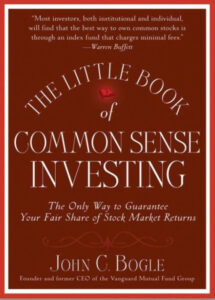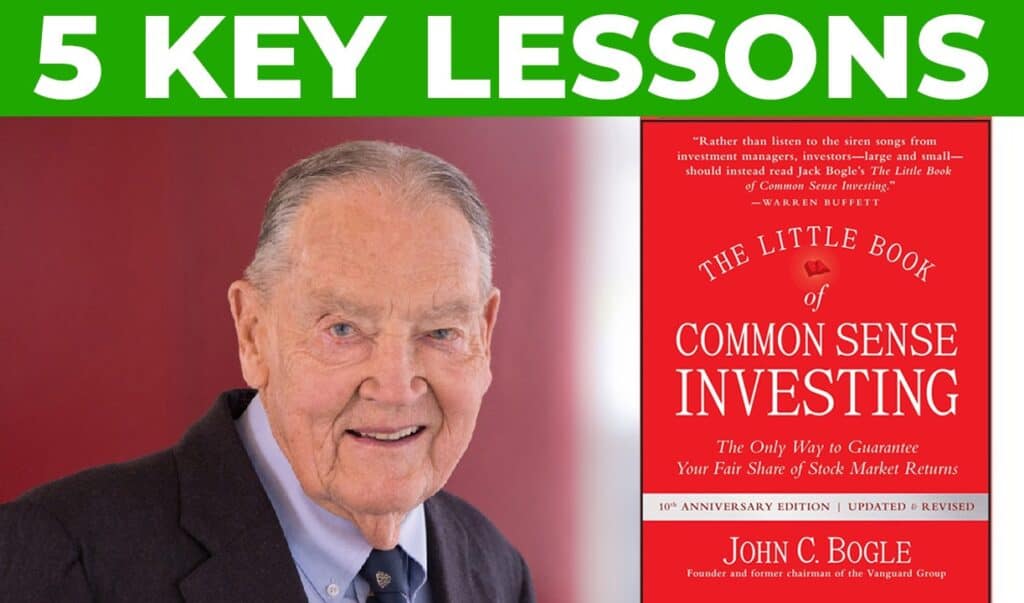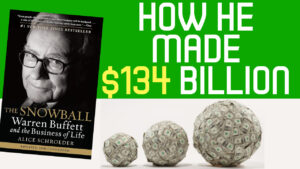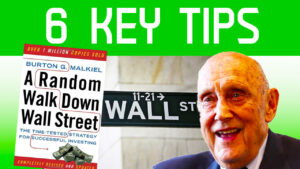In this post we’ll explore key findings from the incredibly popular book called The Little Book of Common-Sense Investing by John Bogle, the founder of Vanguard.  In this timeless masterpiece, Bogle enlightens us about the advantages of index funds versus actively managed funds.
In this timeless masterpiece, Bogle enlightens us about the advantages of index funds versus actively managed funds.
Published in 2007, the book provides wisdom that can help make a great stock market return.
He says it’s time to move away from speculating and chasing high returns offered by professionally managed funds charging management fees.
Let’s explore why John Bogle thinks index funds are often superior and why he built his career around them.
Lesson 1: A long-term approach is key
Bogle asserts that the market often distracts investors, causing them to look more into short-term results instead of the gradual long-term returns.
Moreover, even if managed funds perform great one year, there is no guarantee that they can achieve market-beating returns consistently over the next 30 years. Management turnover and different market dynamics make it challenging for funds to adapt quickly. Market trends can shift rapidly, and it’s hard for investment managers to notice and act upon these trends.
Lesson 2: Rather than tirelessly seeking the needle in a haystack, acquire the entire haystack

In this context, the haystack represents an index fund—a basket of stocks that aims to mirror the entire performance of a particular market or sector. Investing in index funds is less risky than investing in individual stocks as the risk is the overall stock market return.
John Bogle’s philosophy is simple yet profound: the strategy is to acquire a very wide range of public companies at low costs. By doing this, you’re guaranteed to receive almost the total return these businesses make in terms of earnings growth. According to Bogle, aiming to gain a higher return than index funds is not very wise.
Interestingly, during a 35-year time frame, no more than 1% of actively managed funds could make more than 2% above the S&P 500 index. With such low odds, is it wise to invest in actively managed funds?
Lesson 3: Consistency is vital to compounding
While actively managed funds may occasionally outperform the index, they are challenging to find, and their future performance remains uncertain. Managers may retire or change stock picks, resulting in additional trading fees and taxes. Conversely, index funds maintain consistency over the long term—a vital factor in achieving substantial returns.
Remember, because of compounding, a fund that consistently performs well most years will often make higher long-term returns than one that excels only half the time and loses money during the other half.
Let’s think back on the dot-com bubble in the late ’90s to comprehend better how challenging timing the market is. Investors who took advantage of this chance were mocking those who merely invested in the general market during this time when the technology sector dominated the market. However, a significant collapse occurred a few years later, which cost many investors their money. Even if capitalizing on these sector booms is profitable, it is riskier and less likely to deliver consistent profits.
On the other side, index funds offer consistency and have regularly outperformed the market over the long term.
Actively managed funds face numerous challenges which can restrict their returns. These include manager turnover, regulatory limitations, and short-term investment decisions. A great manager may retire, leave the company, or take a different job, disrupting the fund’s performance.
Mutual funds must obey regulations set by the SEC, restricting their potential to seize immediate investment opportunities. On the other hand, index funds provide low-cost diversification, reducing the risk that comes with picking individual stocks.
We’ve all heard Einstein’s famous quote about compound interest being the world’s eighth wonder. Those who understand it earn it, while those who don’t pay for it. With stocks, the incredible power of compounding returns can often be gained from the long-term consistent productivity of businesses. However, these returns are often overshadowed by the compounding force of investing costs.
Bogle warns that playing the game of actively trading stocks in the short term leads to terrible odds of achieving superior returns. The average investor falls short of the market’s long-term returns by engaging in this game.
Lesson 4: Watch investing costs carefully
Warren Buffett once said, “Lower costs often mean higher returns.” Returns often decline as trading and excessive movement within a fund increase. This raises the question for why you should pay experts to manage your investments? Remember that when you invest in actively managed mutual funds, you’re paying highly compensated managers to control your money.
While actively managed funds sometimes beat a market index, they are often challenging to find, and their performance must be weighed against the expenses.
So why pay large fees to mutual funds that have restrictions when securing investments? While a fund manager may have a few lucky years with high returns, this success is not guaranteed to continue. Furthermore, the 2% yearly fees charged by the manager may eat away at your returns, including times when your portfolio decreases in value.
John Bogle advises allocating less than 5% of your portfolio to gold, stocks or other higher-risk markets can make it more interesting without risking too much. While a minor percentage of the portfolio can be allocated to higher-risk investments, it’s critical not to wager your future on the next “surefire” stock that you think might make you rich.
He says don’t waste your hard-earned money on fund managers’ hefty bonuses if their market- returns are reduced by management fees every year. The chances of a professional investment manager consistently beating the market for the next decade are slim.
When it comes to taxation, managed funds fall short of typical index funds. Mutual funds frequently buy and sell stocks over the year, resulting in tax liabilities on any gains.
Lesson 5: Minimize emotions in the decision-making process
Emotions can hinder investors’ decision-making, leading to poor choices driven by greed and the allure of trendy investments. The fund industry often capitalizes on these emotions, promoting new funds that cater to fads and market trends. John Bogle stated that poor outcomes are likely when equally poor market promotions exploit negative investor emotions. As intelligent investors, we must try to avoid these emotional calls.
In summary, The Little Book of Common-Sense Investing by John Bogle presents a compelling case for investing in index funds. You can increase your chances for good stock market returns by following Bogle’s advice and owning much of the nation’s public companies. Actively managed mutual funds are often expensive, tax-inefficient, and have a poor track record of outperforming the market. If you enjoyed reading this make sure you check out more content from the blog.




